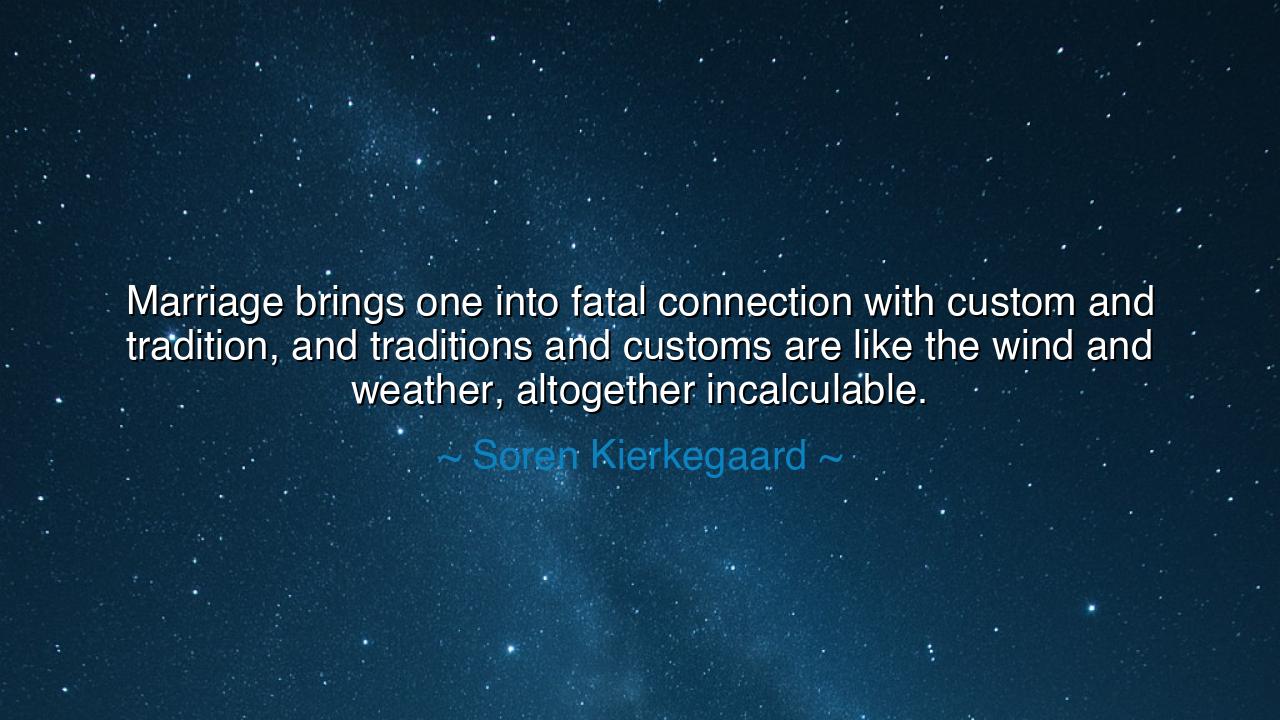
Marriage brings one into fatal connection with custom and
Marriage brings one into fatal connection with custom and tradition, and traditions and customs are like the wind and weather, altogether incalculable.






Søren Kierkegaard, the great philosopher of the spirit, once declared: “Marriage brings one into fatal connection with custom and tradition, and traditions and customs are like the wind and weather, altogether incalculable.” In these words he lays bare the profound tension between love as an intimate bond and marriage as a public covenant. For in the act of marrying, two souls do not only unite with one another—they are also bound to the heavy inheritance of society, its customs, its expectations, and its rituals. To marry is to step not only into the arms of a beloved but also into the arms of tradition, which can either bless or burden, and whose course is as unpredictable as the storm.
When Kierkegaard speaks of a fatal connection, he does not mean death in the body, but the binding of the soul to forces beyond one’s control. Love, left to itself, is free and spontaneous, like the play of sunlight on water. But once enshrined in marriage, it becomes subject to rules: laws of family, demands of culture, and centuries-old expectations. These rules may elevate love, giving it dignity and recognition, but they may also suffocate it, demanding obedience to forms that the heart does not always choose. Thus, marriage is not only the union of two individuals—it is the collision of personal freedom with the winds of tradition.
The image of wind and weather is profound. For just as the sky cannot be mastered, neither can custom and tradition be fully predicted or controlled. One day they blow gently, offering warmth and blessing; the next, they storm and rage, testing the endurance of the household. History offers many examples: marriages once condemned for crossing boundaries of class, race, or religion, later celebrated as symbols of progress and justice. What was taboo in one age may be honor in another. Customs shift, traditions falter, and those bound within them must either bend with the wind or break beneath it.
Consider the story of Princess Mette-Marit of Norway, a commoner and single mother who married Crown Prince Haakon in 2001. At first, tradition scorned her, and public opinion turned against their union. Yet in time, what was condemned became embraced, and today their marriage is celebrated as a symbol of love prevailing over prejudice. Her story is a living echo of Kierkegaard’s words: marriage draws individuals into the unpredictable storms of tradition and public judgment, but those who endure may find that even the fiercest winds eventually calm.
Kierkegaard’s teaching is also deeply personal. He himself was famously engaged to Regine Olsen, yet broke off the engagement, fearing that marriage would trap him in bourgeois respectability and rob him of the solitary calling he believed God had given him. His words about the fatal connection with custom and tradition were not written in abstraction but in the agony of his own heart. For him, the winds of society’s expectations felt suffocating, and he chose solitude over submission. Thus, his quote carries the weight of his lived experience, a warning to all who enter marriage unmindful of its entanglements.
The meaning for us is clear: do not enter marriage blindly, believing it to be only a private bond untouched by the world. Know that to marry is also to enter into history, to face customs and expectations that may support or resist you. Some will find joy in these traditions, drawing strength from the rituals of their people. Others will find themselves battling against them, carving out a space for a love that defies convention. In either case, Kierkegaard bids us to be wise: recognize that the winds of tradition will blow upon your marriage, and be prepared to stand firm or to bend wisely as the weather demands.
The lesson, then, is this: if you seek marriage, prepare not only your heart but also your courage. Study the customs and traditions that will press upon you, but do not be enslaved by them. Where they uplift, embrace them; where they destroy, resist them. Like the sailor who cannot command the storm but can set his sails, so too must those in marriage learn to navigate the unpredictable winds of custom. For only in this way can love survive the fatal connection and find, beyond the storm, the calm waters of reconciliation.
Thus, Kierkegaard’s words are a lantern in the storm: “Marriage brings one into fatal connection with custom and tradition.” They remind us that love is not lived in isolation but within the great tide of history. And though customs may be incalculable as the wind, the wise heart does not despair—it learns to endure, to bend, and to steer its course toward the harbor of enduring love.






AAdministratorAdministrator
Welcome, honored guests. Please leave a comment, we will respond soon